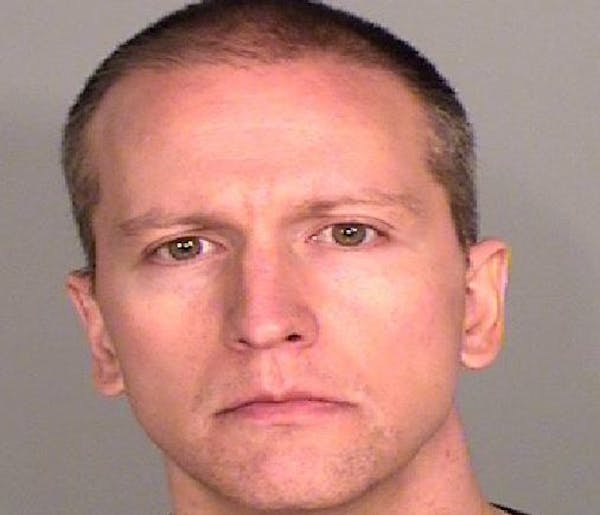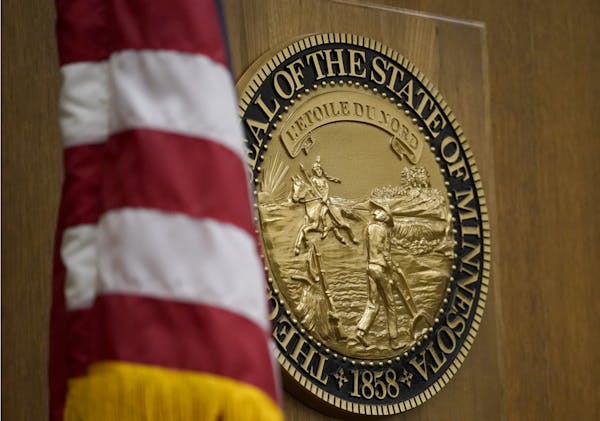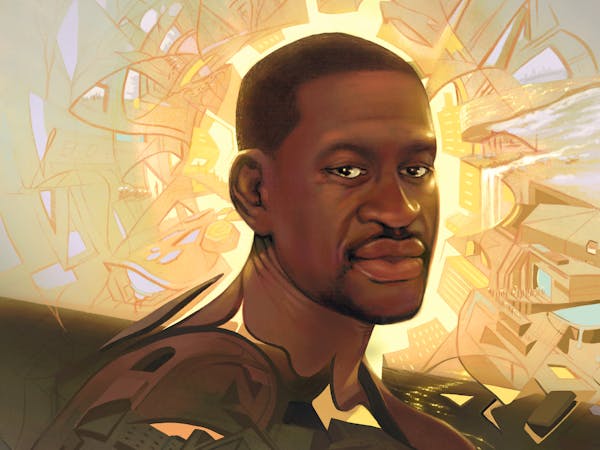Bridgett Floyd loaded boxes with green, red and yellow produce as sunlight beamed through the windows at the Salvation Army.
She cracked jokes. She chatted with volunteers. She evoked the memory of her older brother George Floyd on Thursday, several miles south of the courtroom where the man charged in his killing stood trial as the world watched.
"This has already taken my mind off of what is going on [in the courtroom,] and I needed that a little bit," Bridgett Floyd said. "I needed that a little bit. It's been a trying, trying week. And we will get through it. We will get through it."
After traveling from her home in Fayetteville, N.C., to seek justice for her brother, Floyd took the morning off from watching the trial of former police officer Derek Chauvin. Instead, she spent it giving away food at the Salvation Army food shelf on E. Lake Street. It was the type of service George Floyd knew well: He worked as a security guard for a downtown homeless shelter run by the Salvation Army and often stopped by to visit friends and volunteer for the needy even after his job ended.
"They're going to discredit George Floyd" during the trial, said Jacari Harris, who accompanied Bridgett Floyd to the Salvation Army. "But we want the world to remember and know that George Floyd was active in the community. He volunteered. He showed up. He would give the shirt off his back."
Bridgett Floyd launched the George Floyd Memorial Foundation last September to carry on her brother's legacy and promote social justice. The organization made its first $5,000 donation to the Salvation Army's Harbor Light Center last year and hired Harris as executive director. Bridgett Floyd, who is president, and Harris hope to participate in several more community events during the trial, trying to carry out the deeds they believe George Floyd would still be doing if he were alive.
"It's been an emotional roller coaster," Bridgett Floyd said. "I'm here to stand tall for my brother. To let everyone know that he was not the guy that officers made him to be. ... He had a family. He had a little girl that he left behind. And he left people behind that really cared about him. The community was his heart."
She recalled seeing Floyd when he visited her family in Fayetteville — where he was born in 1973 — about six months before he died. "He enjoyed every minute of it," she said.
Bridgett Floyd described the trial as overwhelming. What really got to her, she said, was when bystander Charles McMillian broke down crying on the witness stand while testifying about how he tried to help Floyd at the scene and admonished Chauvin for kneeling on him. She thought his reaction showed how "there's still love out here. People know the truth and we will get justice."
She added: "He felt how we feel. He broke down how we had been breaking down every single day this has been going on since my brother left on May 25 of last year. It's been a trying time, and I felt his pain."
Harris, who is also visiting from North Carolina, has been accompanying family members to the trial. He said they pray each day beforehand: for justice, peace, unity, love. But watching graphic videos of Floyd's death in recent days has hurt.
"Some of us had to just walk out of the room, the overflow room," Harris said. "It was just that painful to watch over and over and over. We didn't want to be reminded of that so that's why we're here today, to be reminded of the work that George Floyd did."
Hauling some produce back into the kitchen, Salvation Army volunteer John Morrisette said he also finds it difficult to keep watching videos of Floyd's final hour.
"That was hard," he said. "That was hard. But you have to expose yourself to some of that once in a while in life."
As a line of residents in need formed outside, Bridgett Floyd wheeled a cart slowly around a U-shaped display of produce, filling cardboard boxes with pineapples, bananas, potatoes, tomatoes, limes, lemons, mangoes, cabbage, carrots and green chiles. Harris helped her bring them to a table before they went around again.
Bridgett Floyd soon moved to the door, where others were handing out free boxes of produce. Demand has been up since the pandemic began and riots struck the neighborhood after Floyd's death. A middle-aged woman with a young girl walked up.
"We'll take it to your car," Floyd offered, lugging the box with Harris as they walked around the corner through a cold wind.
"Have an awesome day!" she told the woman. Floyd leaned down to say goodbye to the little girl: "See you later, baby!"She walked back and struck up a conversation with Salvation Army Major Robert Viquez, saying, "Today was a very good day."
"Thank you for doing this," Viquez said.She told him she'd love to do more for the Salvation Army in Minnesota: "I will definitely come back."
New Minnesota GOP leaders seek peace with party's anti-establishment wing

Who is Republican Lisa Demuth, Minnesota's first House speaker of color?

Minnesota House GOP, Secretary of State Steve Simon return to Supreme Court
Supreme Court sides with DFL and Simon, says 68 House members needed for floor action



